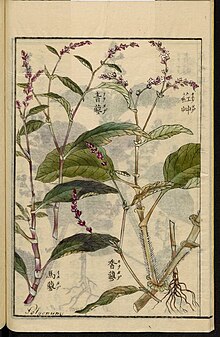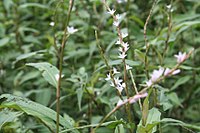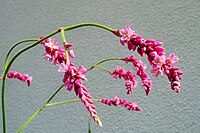Genus of flowering plants in the knotweed family, Polygonaceae
Illustration from the Japanese agricultural encyclopedia Seikei Zusetsu (1804) Persicaria genus of herbaceous flowering plants in the knotweed family, Polygonaceae . Plants of the genus are known commonly as knotweeds [ 2] : 436 smartweeds .[ 3] cosmopolitan distribution , with species occurring nearly worldwide.[ 3] [ 4] Polygonum [ 5]
Description
The genus includes annual and perennial herbs with taproots or fibrous root systems, or with rhizomes or stolons . The stems are often erect but may be prostrate along the ground, and some species are prickly .[ 3] [ 6] deciduous , and variously shaped. The brownish or reddish ochrea may be leathery to papery. The inflorescence may be a panicle or a spikelike or headlike arrangement of fascicles of flowers. The flower is white, greenish, reddish, pink or purple, with the tepals partially fused together along the bases. The fruit is an achene which can take a number of shapes, including a disc or a sphere.[ 3]
Taxonomy
Within the family Polygonaceae , Persicaria is placed in the subfamily Polygonoideae , where the tribe Persicarieae consists of two sister genera, Bistorta Koenigia Persicaria .
Species
As of November 2023[update] [ 8]
Persicaria acuminata (Kunth) M.Gómez Persicaria akakiensis (Cufod.) Soják Persicaria × ambigua (Meisn.) B.Bock Persicaria amphibia (L.) Delarbre – amphibious bistort, water smartweedPersicaria angustifolia (Pall.) Ronse Decr. Persicaria arifolia (L.) Haraldson – halberd-leaf tearthumbPersicaria assamica (Meisn.) Soják Persicaria attenuata (R.Br.) Soják Persicaria barbata (L.) H.Hara Persicaria × bicolor (Borbás) Soják Persicaria biconvexa (Hayata) Nemoto Persicaria bicornis (Raf.) Nieuwl. – pink smartweedPersicaria borneensis (Meisn.) Soják Persicaria × brauniana (F.W.Schultz) Soják Persicaria breviochreata (Makino) Ohki Persicaria bungeana (Turcz.) Nakai – prickly smartweedPersicaria capitata (Buch.-Ham. ex D.Don) H.Gross – pink-head knotweedPersicaria careyi (Olney) Greene – pink-head knotweedPersicaria celebica (Danser) Soják Persicaria cespitosa (Blume) Nakai Persicaria changhuaensis H.W.Zhang & X.F.Jin Persicaria chinensis (L.) H.Gross – Chinese knotweedPersicaria clivorum Seriz. Persicaria × condensata (F.W.Schultz) Soják Persicaria criopolitana (Hance) Migo Persicaria debilis (Meisn.) H.Gross ex W.Lee Persicaria decipiens (R.Br.) K.L.Wilson – slender knotweed, willow-weedPersicaria dichotoma (Blume) Masam. Persicaria diospyrifolia (Cham. & Schltdl.) Funez & Hassemer Persicaria dissitiflora (Hemsl.) H.Gross ex T.Mori Persicaria eciliata M.A.Hassan Persicaria elatior (R.Br.) Soják Persicaria erectominor (Makino) Nakai Persicaria extremiorientalis (Vorosch.) Tzvelev Persicaria ferruginea (Wedd.) Soják Persicaria × figertii (Beck) Soják Persicaria filiformis (Thunb.) Nakai Persicaria foliosa (H.Lindb.) Kitag. Persicaria galapagensis (Caruel) Galasso Persicaria geocarpica Suyama & K.Ueda Persicaria glabra (Willd.) M.Gómez – smooth smartweedPersicaria glacialis (Meisn.) H.Hara Persicaria glandulopilosa (De Wild.) Soják Persicaria glomerata (Dammer) S.Ortiz & Paiva Persicaria greuteriana Galasso Persicaria hassegawae Hanai & Seriz. Persicaria hastatosagittata (Makino) Nakai Persicaria × hervieri (Beck) Soják Persicaria hirsuta (Walter) Small – hairy smartweedPersicaria hispida (Kunth) M.Gómez Persicaria huananensis (A.J.Li) B.Li Persicaria humboldtiana Funez & Hassemer Persicaria humilis (Meisn.) H.Hara Persicaria × hybrida (Chaub. ex St.-Amans) Soják Persicaria hydropiper (L.) Delarbre – water-pepper, marsh-pepper smartweedPersicaria hydropiperoides (Michx.) Small – swamp smartweed, mild water-pepperPersicaria hystricula (J.Schust.) Soják Persicaria imeretina (Kom.) Soják Persicaria × intercedens (Beck) Soják Persicaria japonica (Meisn.) Nakai Persicaria javanica (Bruyn) Soják Persicaria jucunda (Meisn.) Migo Persicaria kawagoeana (Makino) Nakai Persicaria lanata (Roxb.) Tzvelev Persicaria lankeshanensis T.J.Liang & Bo Li Persicaria lapathifolia (L.) Delarbre – pale persicariaPersicaria leblebicii (Yıld.) Raus Persicaria lii Kitag. Persicaria limbata (Meisn.) H.Hara Persicaria limicola (Sam.) Yonek. & H.Ohashi Persicaria longiflora (Courchet) Borodina Persicaria longiseta (Bruijn) Kitag. – bristly lady's thumbPersicaria maackiana (Regel) Nakai Persicaria macrantha (Meisn.) Haraldson Persicaria maculosa Gray – Jesusplant, spotted lady's thumb, redshankPersicaria madagascariensis (Meisn.) S.Ortiz & Paiva Persicaria manshuricola Kitag. Persicaria meisneriana (Cham. & Schltdl.) M.Gómez – Mexican tearthumbPersicaria microcephala (D.Don) H.Gross Persicaria mikawana Hanai & Seriz. Persicaria minor (Huds.) Opiz – small water-pepperPersicaria mitis (Schrank) Assenov Persicaria muricata (Meisn.) Nemoto Persicaria × musashinoensis Hiyama Persicaria nakaii (H.Hara) Cubey Persicaria nataliae Stepanov Persicaria neofiliformis (Nakai) Ohki Persicaria nepalensis (Meisn.) H.Gross – Nepal knotweedPersicaria nogueirae S.Ortiz & Paiva Persicaria obtusifolia (Täckh. & Boulos) Greuter & Burdet Persicaria odorata (Lour.) Soják – Vietnamese corianderPersicaria orientalis (L.) Spach – kiss-me-over-the-garden-gate, prince's feather, princess-featherPersicaria palmata (Dunn) Yonek. & H.Ohashi Persicaria paradoxa (H.Lév.) Kantachot Persicaria paraguayensis (Wedd.) S.T.Kim & Donoghue Persicaria paralimicola (A.J.Li) B.Li Persicaria pensylvanica (L.) M.Gómez – Pennsylvania smartweedPersicaria perfoliata (L.) H.Gross Persicaria peruviana (Meisn.) Soják Persicaria pilushanensis (Y.C.Liu & C.H.Ou) C.F.Kuo ex T.C.Hsu & S.W.Chung Persicaria pinetorum (Hemsl.) H.Gross Persicaria poiretii (Meisn.) K.L.Wilson Persicaria posumbu (Buch.-Ham. ex D.Don) H.Gross Persicaria praetermissa (Hook.f.) H.Hara Persicaria prostrata (R.Br.) Soják - creeping knotweedPersicaria × pseudoincana (Klokov) Doweld Persicaria × pseudolapathum (Schur) D.H.Kent Persicaria pubescens (Blume) H.Hara Persicaria pulchra Soják Persicaria punctata (Elliott) Small – dotted knotweedPersicaria puritanorum (Fernald) Soják Persicaria robustior (Small) E.P.Bicknell – stout smartweedPersicaria rotunda (Z.Z.Zhou & Q.Y.Sun) Bo Li Persicaria rubricaulis (Cham.) Galasso Persicaria runcinata (Buch.-Ham. ex D.Don) H.Gross Persicaria sagittata (L.) H.Gross – American tearthumb, arrowleaf tearthumb, arrowvinePersicaria sagittifolia H.Gross Persicaria segetum (Kunth) Small Persicaria senegalensis (Meisn.) Soják Persicaria senticosa (Meisn.) H.Gross Persicaria setacea (Baldwin) Small – bog smartweedPersicaria setosula (A.Rich.) K.L.Wilson Persicaria sinica Migo Persicaria sinuata (Royle ex Bab.) H.Gross Persicaria snobarii Munshi & Javeid Persicaria stagnina (Buch.-Ham. ex Meisn.) M.A.Hassan Persicaria stelligera (Cham.) Galasso Persicaria strigosa (R.Br.) H.Gross – spotted knotweedPersicaria strindbergii (J.Schust.) Galasso Persicaria subsessilis (R.Br.) K.L.Wilson Persicaria sylvestris Funez & Hassemer Persicaria taitoinsularis (Masam.) Yonek. Persicaria taquetii (H.Lév.) Koidz. Persicaria thunbergii (Siebold & Zucc.) H.Gross Persicaria tinctoria (Aiton) Spach – Chinese indigo, polygonum-indigoPersicaria tomentosa (Schrank) E.P.Bicknell Persicaria trigonocarpa (Makino) Nakai Persicaria umbrosa (Sam.) Galasso Persicaria virginiana (L.) Gaertn. – jumpseedPersicaria viscofera (Makino) H.Gross Persicaria viscosa (Buch.-Ham. ex D.Don) H.Gross ex T.Mori Persicaria wellensii (De Wild.) Soják Persicaria × wilmsii (Beck) Soják Persicaria wugongshanensis Bo Li
Citations
General and cited references






